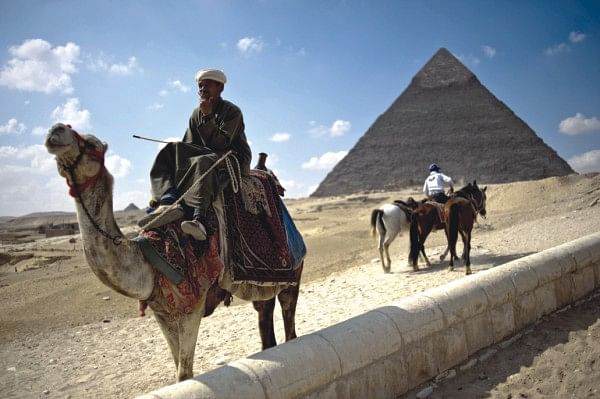Musings
The Nile will Flow on . . .
Syed Badrul Ahsan
Egypt has forever been a fascinating place. It conjures up images of history and snapshots of coruscating beauty. You think of Egypt and you think of its pharaohs and mummies and its Sphinx keeping watch across the vastness of its deserts. For many of us, Egypt is a constant reminder of how royalty can be emblematic of seduction. Cleopatra loved Julius Caesar with passion; and when Caesar died, she fell in deep, till-death-do-us part love with Mark Antony.
Thoughts of Egypt come into the memory as the waters of the Nile rush into a fertilisation of Egyptian villages and towns. You stand on the banks of that historical river and reflect on the nature of fleeting time and impermanent life, for along the Nile, for centuries, have passed boats and ships carrying people and goods and weapons, all geared to purposes both noble and sinister. In school, our teachers drilled the thought into us that Egypt was the gift of the Nile. It is that lesson we remember even as we celebrate the fall of the thirty-year autocracy of Hosni Mubarak and his clan and cohorts.

Egypt reminds one of pyramids, pharaohs, mummies and the Sphinx. Photo: AFP
There are other images of Egypt, political and therefore of historical interest, which pass through the imagination. If you shut your eyes and try to shut out all the dismal memories of the Mubarak years, you will travel back in time, to an era when Gamal Abdel Nasser shook up the country and then shook up the world. There was greatness in him, an expansiveness resting on the bedrock of nationalism. When he and General Naguib ran the corrupt and morally decrepit King Farouk out of town in 1952, the bugle of change was sounded, loud enough for all of us to hear. Arab nationalism was the new buzzword. Nasser pushed Naguib aside and then did the remarkable thing of nationalizing the Suez Canal in 1956. The wolves then pounced on him. Powerful men in Paris, Tel Aviv and London unleashed their weapons on him and his country.
Nasser survived, to see himself transformed into a heroic figure, his appeal extending to those parts of the globe where the ruling classes remained content cosying up to the West, to America. Pakistan's Suhrawardy mocked Nasser's nationalism. Today the world remembers Nasser, warts and all, and ignores Suhrawardy. The entrenched monarchies of the Middle East once quaked in Nasser's presence. Today they go wobbly every time their suppressed subjects sing paeans to Egypt's late leader. Nasser has transcended time, despite that miserable battlefield defeat in June 1967.
And then there was Anwar Sadat. He wept as he told Egypt's people in September 1970 that Gamal Abdel Nasser lived no more. It was then for Egyptians to break into tears. For Sadat, a veteran of the revolution Nasser had guided to fruition in 1952, it was now time to take charge of a huge country, to take it into the future in the absence of the Big Man. In the event, Sadat did the job well. He emerged clean of Nasser's shadow, made his own distinctive imprint on the Egyptian consciousness and went on to provide leadership of a new kind to his people. There was the gregarious about him, an openness that revealed the spontaneity of his soul.

Protestors in the street of Egypt. Photo: AFP
Anwar Sadat could peer into the future, see that it was all dark and deep and yet take the plunge into it. In November 1977, he passed from being a politician to being a statesman when he travelled to Jerusalem in the depths of the night in search of peace in the Middle East. Having gone through his finest hour in October 1973 through the Yom Kippur war, he knew he had changed geopolitics in a way that few in modern times had done before him. Great men are in the company of the gods. Because they are, it is the little men, driven by communal hate and psychological fears, who shoot them down. Sadat was silenced in 1981. The future was then Hosni Mubarak's to build.
And Mubarak went into securing his future and building that of his son Gamal. For 30 long years, he presided over a systematic expansion of political repression and economic corruption in Egypt. He ridiculed himself through having his media mouthpiece doctor his pictures, to show him steps ahead of other global leaders at the White House. He stole the last presidential election and then unabashedly pushed his 'defeated' rival into prison.
Hosni Mubarak was an insult to Egypt, to its history, to Gamal Abdel Nasser, to Anwar Sadat. Memories of him will one day be lost in the sands of the desert that has always made hollow beings of haughty men and women. The Nile will flow, as it has flowed since the beginning of time, into the historical landscapes of the future.
|
Copyright
(R) thedailystar.net 2010 |
